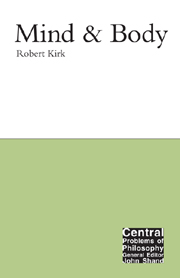2 - Is there something extra?
Summary
Many people feel that no machine of any kind could have thoughts or feelings because these activities involve something non-physical. Certainly our brains and sensory systems are immensely complex, even more complex than computers. But we can know all that and still suspect that no quantity of nerve cells and fibres, no amount of electro-chemical impulses from neurone to neurone, no flushings around of chemical neurotransmitters and neuroinhibitors, facilitating and blocking signals across however many billions of synapses, could possibly add up to thoughts or feelings. Imagine smelling freshly roasted coffee or feeling rain on your face or hearing the faint cry of a marsh bird in the distance on a still evening. Or think of reading about what the government is planning to do and getting indignant about it; or wondering whether to go to France this summer; or gradually coming to realize that the person sitting opposite finds you attractive. How could such thoughts and feelings be just a matter of physical processes?
Dualism
If you think there is something extra, beyond the merely physical, then you are some kind of dualist (unless of course you think there is not even anything physical anyway, in which case you are an idealist). Why should anyone be a dualist? One consideration is that thoughts, emotions, feelings, sensations and conscious experiences generally just seem utterly different from physical things. Another consideration is that at least one form of dualism provides for the possibility that the soul survives death.
- Type
- Chapter
- Information
- Mind and Body , pp. 29 - 46Publisher: Acumen PublishingPrint publication year: 2003

